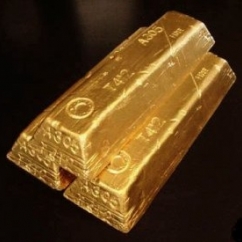Articles and News
IS GOLD HEADED FOR ANOTHER SKYWARD HIKE? | March 26, 2013 (0 comments)

Merrick, NY—Gold climbed above $1,600 the ounce early last week on the news that the European Union will offer bailout assistance to the financially troubled island of Cyprus. According to this report on Reuters.com, the euro zone first agreed to the bailout on the condition that depositors forfeit up to 10% of their savings, shaking confidence in banks across Europe. But just two days later, Kitco.com reported that from a market perspective the situation had calmed down, and by early this week a compromise had been reached that will allow Cypriot depositors with 100,000 euros or less to keep their funds intact, while those with deposits over 100,000 euros in Cypriot banks will take a big hit. The island nation will be allowed to remain in the European monetary system.
But this only serves to show just how volatile the marketplace can be. Kitco.com said the compromise was announced Monday morning, but later on Monday it was reported that a European finance official said the Cyprus compromise could serve as a potential model for other financially troubled European nations—which spooked both U.S. and European stock markets and deflated the Euro currency. But the news rallied the U.S. dollar index and brought gold back up from its low of the day.
The metal climbed 1.2%, to $1610 the ounce last Monday, and gold futures for April delivery also climbed over the $1,600 mark, a 0.75% gain. At press time this week, the metal was trading at $1,605.90.
Some gold bulls still believe a hike is coming. Lee Adler of the Wall Street Examiner makes an argument that gold could hit $3,000 by 2014. But since the beginning of January 2013, the metal has fallen from a high of almost $1,700 the ounce, and at least one analyst told Reuters he doesn’t expect this gold rally to last.
While the Cypriot news spurred some knee-jerk flight to safe havens like gold, investors have grown more confident in recent months on positive economic data from both the United States and China, and have begun moving back into investments with a higher risk/reward ratio.
Indeed, the March 2013 quarterly report from Australia’s Bureau of Resources and Energy Economics suggests gold will continue its gradual decline, eventually sliding down to the low 1300’s—but with an accent on “gradual.” The Bureau doesn’t anticipate gold hitting that level until 2018.
Unless the trouble in Cyprus spreads to the rest of the Eurozone—which has seen stabilization recently—most experts believe it’s not likely to drive gold into the stratosphere.







